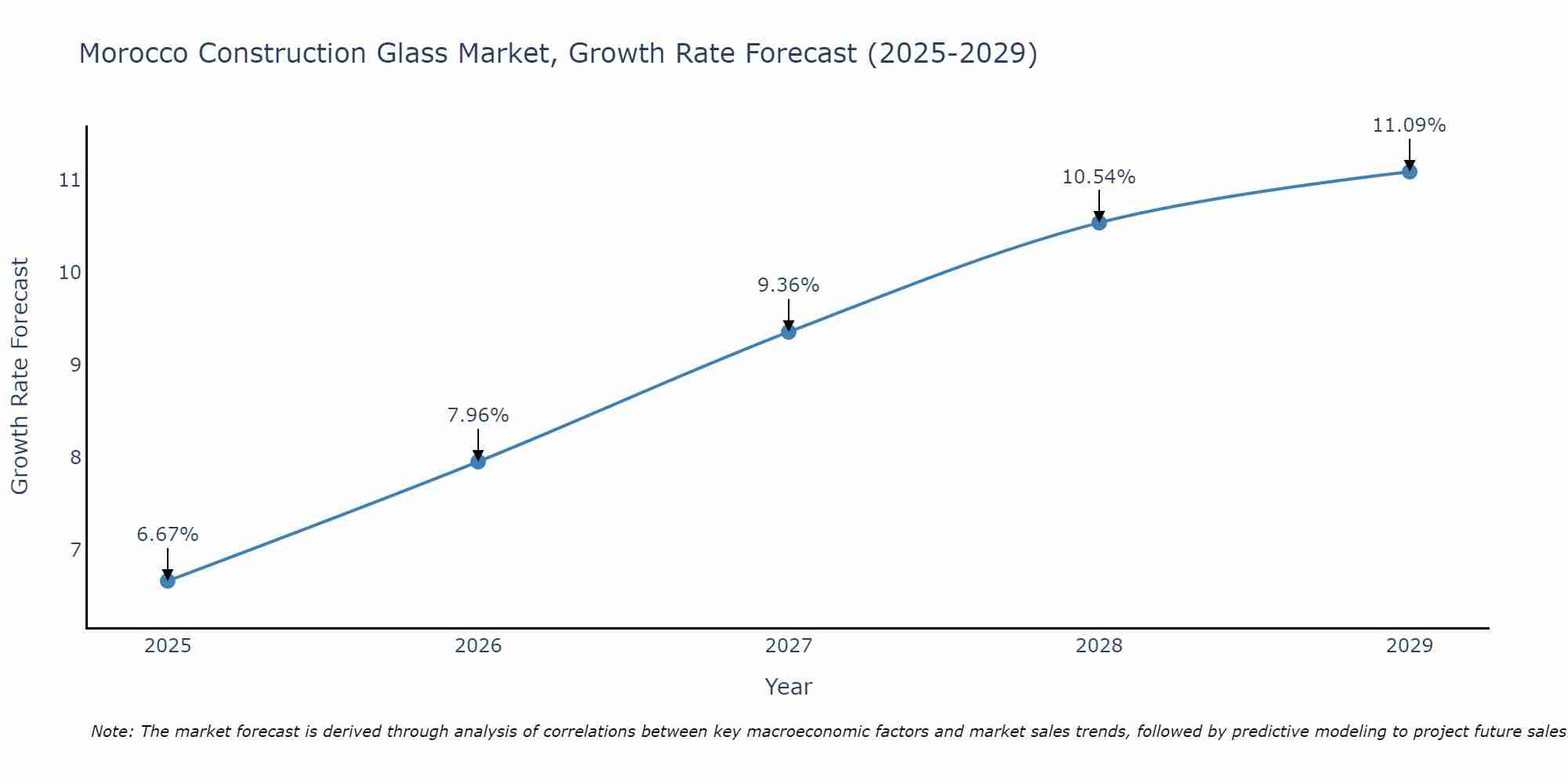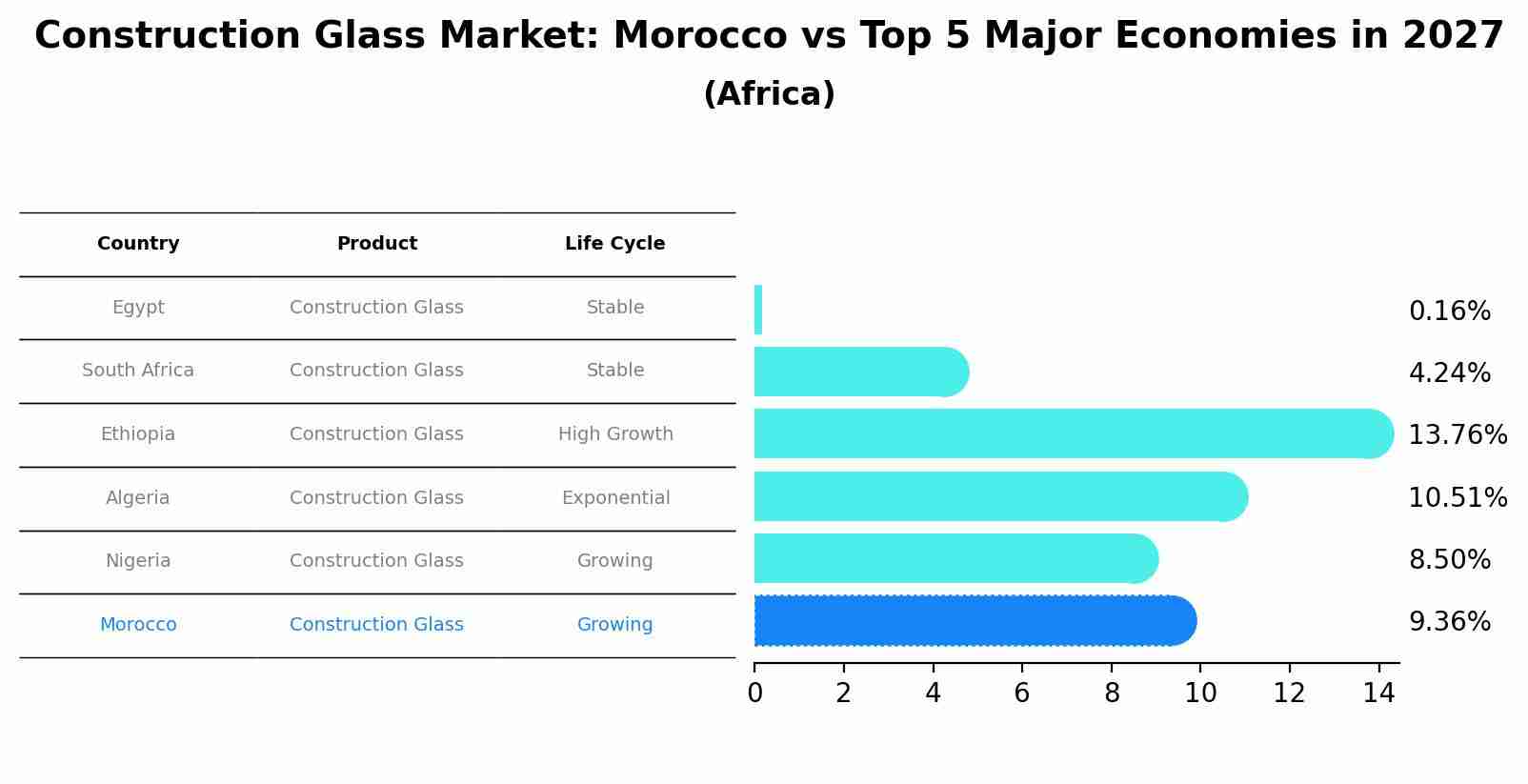Morocco Construction Glass Market Outlook | Trends, COVID-19 IMPACT, Value, Share, Revenue, Size, Analysis, Forecast, Industry, Companies & Growth
| Product Code: ETC355373 | Publication Date: Aug 2022 | Updated Date: Aug 2025 | Product Type: Market Research Report | |
| Publisher: 6Wresearch | Author: Shubham Padhi | No. of Pages: 75 | No. of Figures: 35 | No. of Tables: 20 |
Morocco Construction Glass Market Size Growth Rate
The Morocco Construction Glass Market is poised for steady growth rate improvements from 2025 to 2029. From 6.67% in 2025, the growth rate steadily ascends to 11.09% in 2029.

Construction Glass Market: Morocco vs Top 5 Major Economies in 2027 (Africa)
In the Africa region, the Construction Glass market in Morocco is projected to expand at a growing growth rate of 9.36% by 2027. The largest economy is Egypt, followed by South Africa, Ethiopia, Algeria and Nigeria.

Morocco Construction Glass Market Synopsis
The construction glass market in Morocco is experiencing steady growth, driven by the booming construction sector and increasing focus on energy-efficient building materials. With advancements in glass technology and designs, there`s a growing demand for glass products in residential, commercial, and institutional constructions. Additionally, stringent building codes and sustainability standards are further shaping the market landscape.
Drivers of the market
The construction glass market in Morocco is driven by the rising demand for energy-efficient and aesthetically appealing building materials. The growing adoption of green building practices and the emphasis on sustainable construction significantly contribute to the market`s growth. Advances in glass manufacturing technologies, such as smart glass and low-emissivity glass, offer enhanced thermal insulation and energy savings, further boosting the demand. Additionally, the expansion of residential, commercial, and infrastructural projects across the country supports the increasing use of construction glass.
Challenges of the market
The Morocco construction glass market plays a crucial role in the country`s architectural landscape, offering solutions for energy efficiency, aesthetics, and safety. However, the market faces several challenges that impact its growth and competitiveness. One significant challenge is the lack of domestic manufacturing capacity for specialized glass products, leading to heavy reliance on imports and exposing market players to supply chain risks and price fluctuations. Moreover, stringent regulatory requirements and bureaucratic procedures for product certification and import approvals contribute to market entry barriers and delay project timelines. Streamlining regulatory processes and harmonizing standards is essential to facilitate market access and promote innovation. Additionally, limited awareness and technical expertise among architects, designers, and contractors regarding the benefits and applications of advanced glass technologies hinder market expansion. Education and training programs are needed to promote the adoption of energy-efficient and high-performance glass solutions. Furthermore, fluctuating raw material prices, particularly for rare earth elements used in glass coatings and additives, pose cost pressures and margin erosion for manufacturers. Diversification of raw material sources and investments in recycling and circular economy initiatives can enhance market resilience and sustainability. Overcoming these challenges requires collaborative efforts from industry stakeholders, government agencies, and academia to address market barriers, promote innovation, and unlock the full potential of the construction glass market in Morocco.
Government Policy of the market
The Morocco government has implemented policies to support the development of the construction glass market, recognizing its crucial role in building aesthetics, energy efficiency, and environmental sustainability. Through initiatives aimed at promoting the use of energy-efficient and high-performance glass products, the government encourages investment in glass manufacturing facilities and research and development activities. Additionally, the government provides incentives for the adoption of green building practices that prioritize the use of sustainable materials, including glass, in construction projects. By fostering collaboration between industry stakeholders and academia, the government aims to drive innovation and competitiveness in the construction glass market while ensuring compliance with quality and safety standards.
Key Highlights of the Report:
- Morocco Construction Glass Market Outlook
- Market Size of Morocco Construction Glass Market, 2024
- Forecast of Morocco Construction Glass Market, 2031
- Historical Data and Forecast of Morocco Construction Glass Revenues & Volume for the Period 2018 - 2031
- Morocco Construction Glass Market Trend Evolution
- Morocco Construction Glass Market Drivers and Challenges
- Morocco Construction Glass Price Trends
- Morocco Construction Glass Porter's Five Forces
- Morocco Construction Glass Industry Life Cycle
- Historical Data and Forecast of Morocco Construction Glass Market Revenues & Volume By Chemical Composition for the Period 2018 - 2031
- Historical Data and Forecast of Morocco Construction Glass Market Revenues & Volume By Soda-lime for the Period 2018 - 2031
- Historical Data and Forecast of Morocco Construction Glass Market Revenues & Volume By Potash-lime for the Period 2018 - 2031
- Historical Data and Forecast of Morocco Construction Glass Market Revenues & Volume By Potash-lead for the Period 2018 - 2031
- Historical Data and Forecast of Morocco Construction Glass Market Revenues & Volume By Type for the Period 2018 - 2031
- Historical Data and Forecast of Morocco Construction Glass Market Revenues & Volume By Low-e Glass for the Period 2018 - 2031
- Historical Data and Forecast of Morocco Construction Glass Market Revenues & Volume By Special Glass for the Period 2018 - 2031
- Historical Data and Forecast of Morocco Construction Glass Market Revenues & Volume By Manufacturing Process for the Period 2018 - 2031
- Historical Data and Forecast of Morocco Construction Glass Market Revenues & Volume By Float Process for the Period 2018 - 2031
- Historical Data and Forecast of Morocco Construction Glass Market Revenues & Volume By Rolled/sheet Process for the Period 2018 - 2031
- Historical Data and Forecast of Morocco Construction Glass Market Revenues & Volume By Application for the Period 2018 - 2031
- Historical Data and Forecast of Morocco Construction Glass Market Revenues & Volume By Residential for the Period 2018 - 2031
- Historical Data and Forecast of Morocco Construction Glass Market Revenues & Volume By Commercial for the Period 2018 - 2031
- Historical Data and Forecast of Morocco Construction Glass Market Revenues & Volume By Others for the Period 2018 - 2031
- Morocco Construction Glass Import Export Trade Statistics
- Market Opportunity Assessment By Chemical Composition
- Market Opportunity Assessment By Type
- Market Opportunity Assessment By Manufacturing Process
- Market Opportunity Assessment By Application
- Morocco Construction Glass Top Companies Market Share
- Morocco Construction Glass Competitive Benchmarking By Technical and Operational Parameters
- Morocco Construction Glass Company Profiles
- Morocco Construction Glass Key Strategic Recommendations
Frequently Asked Questions About the Market Study (FAQs):
- Single User License$ 1,995
- Department License$ 2,400
- Site License$ 3,120
- Global License$ 3,795
Search
Thought Leadership and Analyst Meet
Our Clients
Related Reports
- Afghanistan Apparel Market (2026-2032) | Growth, Outlook, Industry, Segmentation, Forecast, Size, Companies, Trends, Value, Share, Analysis & Revenue
- Canada Oil and Gas Market (2026-2032) | Share, Segmentation, Value, Industry, Trends, Forecast, Analysis, Size & Revenue, Growth, Competitive Landscape, Outlook, Companies
- Germany Breakfast Food Market (2026-2032) | Industry, Share, Growth, Size, Companies, Value, Analysis, Revenue, Trends, Forecast & Outlook
- Australia Briquette Market (2025-2031) | Growth, Size, Revenue, Forecast, Analysis, Trends, Value, Share, Industry & Companies
- Vietnam System Integrator Market (2025-2031) | Size, Companies, Analysis, Industry, Value, Forecast, Growth, Trends, Revenue & Share
- ASEAN and Thailand Brain Health Supplements Market (2025-2031) | Strategy, Consumer Insights, Analysis, Investment Trends, Opportunities, Growth, Size, Share, Industry, Revenue, Segments, Value, Segmentation, Supply, Forecast, Restraints, Outlook, Competition, Drivers, Trends, Demand, Pricing Analysis, Competitive, Strategic Insights, Companies, Challenges
- ASEAN Bearings Market (2025-2031) | Strategy, Consumer Insights, Analysis, Investment Trends, Opportunities, Growth, Size, Share, Industry, Revenue, Segments, Value, Segmentation, Supply, Forecast, Restraints, Outlook, Competition, Drivers, Trends, Demand, Pricing Analysis, Competitive, Strategic Insights, Companies, Challenges
- Europe Flooring Market (2025-2031) | Outlook, Share, Industry, Trends, Forecast, Companies, Revenue, Size, Analysis, Growth & Value
- Saudi Arabia Manlift Market (2025-2031) | Outlook, Size, Growth, Trends, Companies, Industry, Revenue, Value, Share, Forecast & Analysis
- Uganda Excavator, Crane, and Wheel Loaders Market (2025-2031) | Strategy, Consumer Insights, Analysis, Investment Trends, Opportunities, Growth, Size, Share, Industry, Revenue, Segments, Value, Segmentation, Supply, Forecast, Restraints, Outlook, Competition, Drivers, Trends, Demand, Pricing Analysis, Competitive, Strategic Insights, Companies, Challenges
Industry Events and Analyst Meet
Whitepaper
- Middle East & Africa Commercial Security Market Click here to view more.
- Middle East & Africa Fire Safety Systems & Equipment Market Click here to view more.
- GCC Drone Market Click here to view more.
- Middle East Lighting Fixture Market Click here to view more.
- GCC Physical & Perimeter Security Market Click here to view more.
6WResearch In News
- Doha a strategic location for EV manufacturing hub: IPA Qatar
- Demand for luxury TVs surging in the GCC, says Samsung
- Empowering Growth: The Thriving Journey of Bangladesh’s Cable Industry
- Demand for luxury TVs surging in the GCC, says Samsung
- Video call with a traditional healer? Once unthinkable, it’s now common in South Africa
- Intelligent Buildings To Smooth GCC’s Path To Net Zero


















